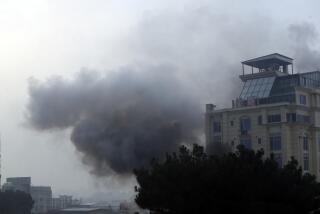9 dead after bombings at Indonesia hotels
MANILA — Two powerful bomb blasts targeting major international hotels rocked the business district of the Indonesian capital today, killing nine people and wounding at least 50 others.
Authorities did not immediately identify the perpetrators of the explosions at the Ritz-Carlton and Marriott hotels in Jakarta, but anti-terrorism forces were at the scenes of both explosions.
Bombings have been a familiar risk in Indonesia, the world’s most populous Muslim nation, but a security crackdown in recent years has made the country calmer and given it a sense of greater security. Past bombings have been blamed on Jemaah Islamiyah, an Islamic militant group affiliated with Al Qaeda, and coordinated attacks are a hallmark of groups associated with the terrorist network. But authorities say that ethnic tensions, politics or criminal enterprises could be at the root of the attacks.
The explosions struck the Ritz-Carlton’s Airlangga restaurant and the basement of the Marriott, which was also the target of a bomb attack in 2003 that killed 12 people. That blast was blamed on Jemaah Islamiyah.
The Marriott quickly became a prominent symbol of the U.S. presence in Jakarta after it opened in September 2001. The five-star hotel has been a frequent setting for official American events, including the U.S. Embassy’s Independence Day celebrations in recent years.
Witnesses said they heard a loud explosion at the Marriott, followed shortly by a blast at the Ritz. “There were bodies on the ground. One of them had no stomach,” one witness told the Associated Press. “It was terrible.”
Security Minister Widodo Adi Sucipto told reporters at the scene that the hotel blasts occurred at 7:45 a.m. and 7:47 a.m. and that “high explosives were used.” He said at least nine people were killed and 50 injured.
“This destroys our conducive situation,” Sucipto said.
While information about the victims was scarce, authorities said a New Zealander was believed to have been killed. Thirteen other foreigners were among the injured, they said.
Indonesian officials have waged a war against terrorist assaults, and officials say it has been three years since the last major attack.
Government spokesman Dino Patti Djalal told CNN that officials would determine who caused the attacks.
“This is a blow to us,” Djalal said. “The president has built his reputation on . . . anti-terrorism policies. Make no mistake, he will hunt whoever is behind this.”
As has become common in many Southeast Asian and South Asian capitals, major hotels in Jakarta have checked vehicles and required guests to pass through metal detectors.
The Manchester United soccer team was scheduled to check in to the Ritz on Saturday, the Indonesian Football Assn. told the Associated Press.
In 2002, major blasts on the tourist island of Bali killed 202 people, many of them Australian tourists. Three of the bombers were later executed.
Bali was targeted again in 2005 in a blast that killed 20 people, many of them foreign tourists, and wounded 100. That incident was linked to Jemaah Islamiyah as well.
Some analysts have said they believe Jemaah Islamiyah is splintering and that the threat is receding. However, others feared that the release from jail of some of its members could lead to new attacks.
A report in the Australian newspaper said released members “are gravitating towards hard-line groups who continue to advocate Al Qaeda-style attacks against Western targets. These hard-line groups continue to believe that the use of violence against ‘enemies of Islam’ is justified.”
--
More to Read
Sign up for Essential California
The most important California stories and recommendations in your inbox every morning.
You may occasionally receive promotional content from the Los Angeles Times.











